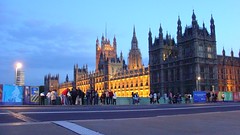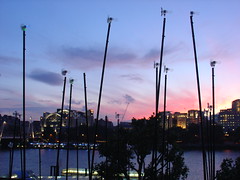Bern
Monday is generally a bad to museum-hop in Europe: most galleries and museums are closed, and plenty of other places have reduced hours. Lasse, Tanja and I decided to visit one of the few open spots: the house Einstein stayed at while developing relativity theory (listed on one map only as "Einsteinhaus"). I could just imagine him staring at this one clock on the wall, imagining it slowing down as it sped by. The lady who gives out the tickets was great &mash; she admitted to not understanding his math and science, but loving his humanistic philosophy. I think she might have had a crush on him too.
I forget the context, but they had a great Schopenhauer quote I hadn't seen before: "We can do what we want, but can't will what we will." A wonderful one-liner for discussing determinism.
From Einstein's house we walked down the street and over a bridge to the botanical gardens, which had far too many plants trees and mosses to even begin exploring. In the distance there was some sort of Swiss folk band playing, with plenty of accordion and funny German melodies. We imagined they were wearing leiderhosen.
Lasse and Tanja were on their way back to Denmark, and had to leave that afternoon for Luzern, so I walked with them to the train station and said goodbye.
For lunch I grabbed the cheapest meal I could find, an 8CHF kebab that turned out to be pretty decent. To make up for the day before in Lyon I got some blackberries from the market. With the whole day ahead, I was still trying to think of something to do. The night before, at the hostel, someone told me that the rose gardens to the East weren't worth the hike, which meant there was probably a great view from the top they missed.
About halfway up I was about to agree with the guy from the hostel, but it turned out to be pretty decent. There's a Japanese restaurant at the top for some reason, and I smaller rose gardens near the exit of the path up the hill. I have a feeling the guy at the hostel just saw this small garden. If you go further you get to the main area, where at least 50 varieties of roses are arranged in concentric rectangles.
I smelled most of them — I had no idea how much variety there was in rose aromas. A lot of questions came to mind: do flowers smell like they look, just as lions growl and birds chirp, sounding like they act? And would it be how they look to us, or to the bees in ultraviolet? Maybe only we can smell flowers "correctly" and only bees can see them "correctly"?
I took notes on a few as well:
- "Nella Martinetti" was my favorite, with a hint of citrus, berry, and reminders of the forest and beach simnultaneously
- "Papa meilland" smells like lysol
- "Charlie chaplin" has a hint of chai or earl grey
- "Magicienne 78" was the most citrusy
On the way back from the rose garden I happened upon the bear pits, which are just depressing. Two Bernese bears wandering aimlessly about a concrete hole in the ground with a few trees and rocks is not my idea of a humane tourist attraction.
Walking back to the hostel it started seriously raining. Back in my room I met two Northern Irish guys playing cards, Jim (the talkative one) and his friend (whose name I can't remember, the quiet one). The rest of the evening was spent eating Toblerone, meeting dorm mates and playing cards. At the height of it we had everyone involved: myself, the two Northern Irish guys, two Londoners named Alasdair (Al) and Matt, two Australian girls, two English girls named Toni and Becky, a Swiss'Indian named Thisan, his omniglot Swiss friend Marvin, and two slightly punk girls I'm pretty sure were from another dorm. Some games we played:
- Egyptian Ratscrew Taught to me by my sister Kiera and her boyfriend Baron, involves super fast pattern matching and deck slapping.
- Jack-change-it A "get rid of your cards" game where you must match the suit or number of the card, complicated by special cards.
- Murder in the Dark Not really a card game, but dealt using cards. Using who was killed as hints, everyone has to figure out who the two murderers are and send them to prison by a vote. Involves lots of counter accusations. I was dealt as murderer and managed to have my co-murderer Toni sent to jail, kill the doctor, and win the game. Best when you have an Irish guy as the storyteller &mdash. "Last night, a dark and sto-ormy night, t'ere was a mu-urder..."
- Cheat Also called "BS", you put cards of a kind on the table face down, moving up or down from the last card, while telling everyone they are. If you lie and someone calls you on it, you take the deck. If you're telling the truth, they take it.
- Spoons A fast game where you keep four cards in hand and pass the deck around the table card by card. First to collect four of a kind grabs a "spoon" (random object in the center of the table). There is always one less spoon than there are players, so there are no winners, just one loser.
There was also plenty of discussion earlier in the evening about politics and discrimination. Thisan is incredibly emotional and argumentative, which was compounded by his poor understanding of English, resulting in lots of cursing in German and some in Tamil. Realizing he didn't want to argue, just accuse, I listened for about an hour to his problems with America — domestic and international, with plenty of additions from other dorm mates. When he finished I told him that not all of America agrees with the government's decisions, most Americans aren't racist and some are actively trying to undo lasting effects of discrimination (whether this is a good idea is another discussion), and that you shouldn't say anything about America if you haven't been there and the first place you want to visit is Las Vegas. Though I didn't say the last part quite like that.
Thisan seemed to have made enemies of most of the people by the end of the night, if not for arguing with them just for being loud, but he gave me his number and said to call if I was ever back in Switzerland.
In the end, the Londoners drank quite a bit, Thisan started losing his voice, and a good time was had by all. It never did stop raining though.


